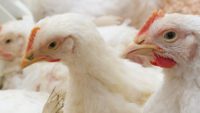The U.S. Department of Agriculture, Food and Drug Administration and Centers for Disease Control and Prevention, as well as state veterinary and public health officials, are investigating an illness among primarily older dairy cows in Texas, Kansas and New Mexico that is causing decreased lactation, low appetite and other symptoms.
As of March 25, unpasteurized, clinical samples of milk from sick cattle collected from two dairy farms in Kansas and one in Texas, as well as an oropharyngeal swab from another dairy in Texas, have tested positive for highly pathogenic avian influenza, or HPAI. Additional testing was initiated on March 22, and over the weekend because farms have also reported finding deceased wild birds on their properties. Based on findings from Texas, the detections appear to have been introduced by wild birds. Initial testing by the National Veterinary Services Laboratories has not found changes to the virus that would make it more transmissible to humans, which would indicate that the current risk to the public remains low.
Federal and state agencies are moving quickly to conduct additional testing for HPAI, as well as viral genome sequencing, so that they can better understand the situation, including characterization of the HPAI strain or strains associated with these detections.
At this stage, there is no concern that this circumstance poses a risk to consumer health.
Federal agencies are also working with state and industry partners to encourage farmers and veterinarians to report cattle illnesses quickly so that agencies can monitor potential additional cases and minimize the impact to farmers, consumers and other animals.
This is a rapidly evolving situation, and USDA and federal and state partners will continue to share additional updates as soon as information becomes available. More information on biosecurity measures is available here.
Source: USDA's APHIS



.jpg?height=200&t=1670643738&width=200)
Report Abusive Comment